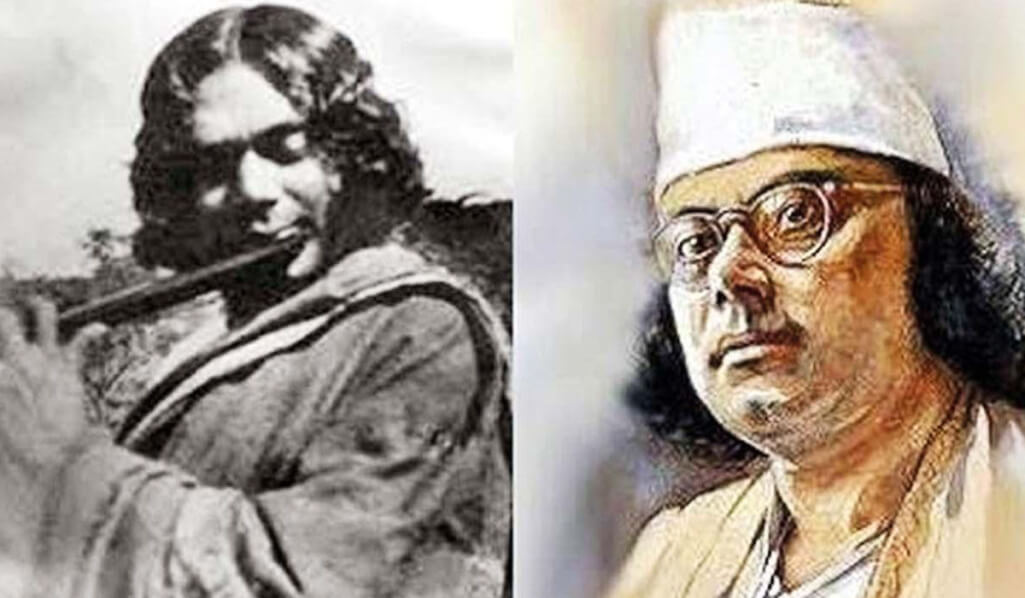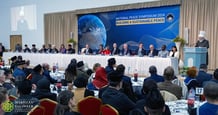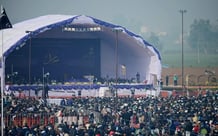The Indian Freedom Struggle was a time of glorious achievements. It produced luminaries in the field of peace like Mahatma Gandhi and the war like Subhash Chandra Bose. It gave us important spiritual figures like Swami Vivekananda and literature was graced by the presence of bards like Rabindranath Tagore, Muhammad Iqbal, and Jibanananda Das. But very few can lay claim of being a pioneer in each of these fields like Kazi Nazrul Islam was. He was a beacon of peace, secularism, and universalism against communalism, yet he was a person of revolutionary ideas who fought in the First World War.
Kazi Nazrul Islam was a spiritual awakener of the masses through his contribution to Islamic and Hindu devotional lyrics and he remains most renowned as a poet whose submissions to Bengali literature encompass an eponymous body of work.
All the visions he espoused in writing have been covered in detail but an unfortunate corollary of that effort has meant that he has been identified as just a poet and an author who contributed to the Indian Freedom Movement as an ideologue above the political fray. But his contributions far exceed that. In fact, as we remember him on his 121st birth anniversary, we will try to look at his contributions to the struggle on the ground and how he was directly involved in the politics of that time.
Kazi Nazrul Islam got directly involved in politics as a leader of the freedom struggle on 1st November 1925. He along with Hemanta Kumar Sarkar , Kutubuddin Ahmed, and Shamsuddin Hussain founded the Labour Swaraj Party within the Indian National Congress(INC). While the party was influenced by communism, they followed the manifesto of the INC to achieve “social and economic emancipation” through “non-violent mass action”.
Kazi Nazrul Islam naturally took over the direction of the party mouthpiece due to his literary acumen. The name given to the publication was “Langal” which means “The Plough” in Bengali.
In the very first issue in December 1925, one of his most famous works appeared therein. Titled “Samyabadi” which translates loosely as “The Egalitarian” in English, he invoked the plurality of religions in our country and asked all of them to unite in a common struggle. He called the multitudes to not look without but within their own human hearts because it is in the human heart, as he so powerfully evoked, that all the prophets and the saints and the messiahs found the truth. As Kazi Nazrul Islam implied, the heart provides a better shrine that any temple or the Kaaba.
The first issue of Langal also described the ideology Kazi Nazrul Islam wanted to bring to his politics. Right on the title page appeared a laborer with a spade on his shoulder giving a helping hand to another partially visible laborer to help him get to his feet.
Kazi Nazrul Islam believed that the working class should stay united and help each other; irrespective of religion which he reinforced through his poetry as given above. It also said that in future issues it would try to bring to attention the rights of the subjects as it believed in spreading awareness amongst the masses rather than just being a philosophical or literary movement. Within the issue, there were eleven of Kazi Nazrul’s own poems, beginning with the aforementioned “Samyabadi”. “Barangona” and “Nari” focussed on the abuse of women in society by those in power. The last poem in the first issue was titled “Kuli Mojur”, which meant “Porters and Labourers” and evoked the sentiment the poet felt as he would see a porter kicked out of a train compartment by someone better off. He thus brought to his politics a mixture of non-violence, socialism, religious plurality, women’s rights, and laborer’s rights; ideas that are considered progressive even today.
Beyond writing for the official organ of the party, he was also actively involved in campaigning for the Labour Swaraj Party. He campaigned for Kutubuddin Ahmed in the by-election from Bashirhat in current-day West Bengal. Such was his enthusiasm for getting the desired change through politics that he fell ill during the campaign and had to be nursed back to health by his loving wife and mother-in-law. By the time he got well again, due to a shortage of funds and trouble with authorities, had ceased to . In that time, the Labour Swaraj Party, named Sramik Praja Swaraj Dal in Bengali, splintered from the INC and established an independent identity as “Bangia Krishak o Sramik Dal” or “Workers and Peasants Party of Bengal”. The new mouth organ of the party was named as Ganabani, to which again Kazi Nazrul became a primary contributor.
This began a new phase in Kazi Nazrul’s political career where he contributed extensively to Ganabani as an essayist instead of a poet and focussing mainly on communal harmony. There had been significant riots in Calcutta in the period of 1925-26 and he took it upon himself to uphold the spirit of religious egalitarianism. He wrote a couple of essays titled “Mandir-Masjid” and “Hindu-Muslim” talking about the scourge of communalism.
In Mandir-Masjid he evocatively wrote, “Hearing the weeping of the wounded, the mosque does not waver, nor does the Goddess-in-stone of the temple respond”; thus talking of the futility of fighting in the name of religion instead of upholding one’s religious principles. In Hindu-Muslim, he provoked by saying,
“Krishna, Muhammad, and Christ have become national property. Property is the root of all evil. Men do not quarrel for light, but they quarrel over cattle”.
He was thereby saying that people wanted to own the religion for themselves for their vested interests instead of using them as tools for the betterment of the common person. 1926 would also mark his maiden foray into electoral politics when he stood from Dhaka in an election. Unfortunately, with only three hundred-odd rupees which he had got from Bidhan Chandra Roy, and despite Pir Badshah Mia’s entreaty to everyone to vote for Kazi Nazrul, he did not win the seat against much better-funded opponents who came from aristocratic backgrounds.
After this phase, Kazi Nazrul withdrew from active politics and channeled his political thoughts through fiction. He wrote three novels: “Bandhon Hara” (1927), “Mrityukshudha” (1930), and “Kuhelika” (1931). In the first of these novels, “Bandhon Hara” or “Unfettered’, Kazi Nazrul Islam strikes a semi-autobiographical pose. He talks of the unrequited love of two women for the protagonist Nuru, who enlists in the British Army.
Nuru’s correspondence with these two women and other characters of the story firmly ensconce him in the galaxy of true revolutionaries. It establishes someone who flows against the current. He draws a strong theme of how those two women whose love he refuses to acknowledge go on to be married off into unhappy lives due to the lack of rights for Muslim women. It talks about the main character’s rebellious nature and how it gets him into trouble. A lady from the Brahmo Samaj, which was the driving force behind the Bengali Renaissance, is the positive guiding light in this novel and emphasizes on education and opportunity for women.
His second literally “The Hunger of Death”, delves further into communist revolutionary ideology beyond equality for women. Here there are layers to the story that are impossible to capture in one article but it traverses religion, misogyny, poverty, socialism, and society in general. Then living in Krishnanagar, where he moved with his family in 1926, Kazi Nazrul was probably inspired by some of the real-life happenings there, as noted by Niaz Zaman who has translated Kazi Nazrul’s work into English. He pithily observes the fight between Muslim and Christian women of the area, when initially they might have belonged to the same caste earlier.
It talks beautifully about how a lady has lost three sons and only one son is left to take care of his own wife and the three windows in the family. In that too, the supposed caretaker tries to seduce the middle widow, who refuses his purported advances. She later converts to Christianity because she wanted to live again as a human and not as a widow. When she converts, she is asked to dress like a foreign lady, which she refuses which invites the question of why she converted at all from Islam to Christianity, if she did not want to follow the customs. She replies that she wanted to escape the bondage and be free but not then fall into another gilded cage .
In this novel, the character of Ansar is taken up by the Bolshevik revolution in Russia . Inspired by those ideals, just as Kazi Nazrul was politically in real life, he is the only one who seems to understand why the lady, known earlier just as the middle wife but who now has the name Helen, has converted and believes that she was not given the rightful place in society.
The third novel “Kuhelika”, or “Enigma”, also features an armed revolutionary inspired by socialism. It also features romanticism but at its core are two revolutionaries, the Muslim protagonist who joins the group of a secular revolutionary. The book raises the prospect of armed struggle against the British, comradeship of the poor with the protagonist who is the son of a landlord, Hindu-Muslim unity, and female revolutionaries fighting together with men to achieve freedom. The sheer pathos of the hero of the novel being sent to the Andaman Islands to be incarcerated, while he asks his mother to share his assets among the women he loves because he believes they will best carry on his work of helping the oppressed, is arguably peerless in political fiction literature.
The above would be the last novel Kazi Nazrul wrote.
Tragedies were to shape his life at this juncture which could explain his subsequent gradual withdrawal from politics. His mother passed away in 1928 and then his second son passed away the next year in 1929. The latter event, coming on top of him already having lost one son, had a profound effect on him. He thereafter became more reticent and veered away from political writings and activism towards spirituality.
His writings and recordings thence were marked down as literary masterpieces of spiritual awakening. He composed for theatre and films, record, was on the radio and this time could be considered the most prolific of his musical career. He excelled in this path before his talent would get tragically curtailed by Pick’s disease in 1942. He never returned to politics, but the brief few years he gave us should remain a guiding light to progressive political thought even today. He was a repeated and fierce advocate of secularism, socialism, and women’s emancipation and he left behind a blueprint for future generations to model their successes on. And most wonderfully, the template he left was composed of words that inspired, so no one could ever forget them even if they read it just once.













